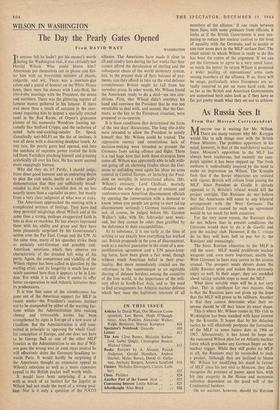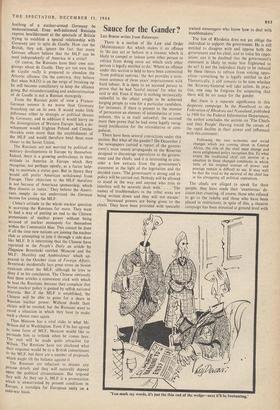As Russia Sees It
From Our Moscow Correspondent oscow too is waiting for Mr. Wilson.
There are many reasons why Mr. Kosygin would like to talk things over with the British Prime Minister. The problem uppermost in his mind, however, is that of the multilateral nuclear force. Moscow's opposition to the MLF has always been vociferous, but recently the cam- paign against it has been stepped up. The fresh outburst is undoubtedly inspired by the need to make an impression on Wilson. The Kremlin feels that if the Soviet objections are restated with vigour, Britain will refrain from joining the MLF. Since President de Gaulle is already opposed to it, Britain's refusal would kill the project outright. The Russians do not believe that the Americans will come to any bilateral arrangement with the West Germans. The political furore caused by such an agreement would be too much for both countries.
For the very same reason, the Russians also do not believe that in present conditions the Germans would dare to do a de Gaulle and join the nuclear club. However, if the C -rmans do so they will have hell to pay for it, the Russians add menacingly.
The basic Russian objection to the MLF is still the same : MLF would proliferate nuclear weapons and, even more important, enable the West Germans to have easy access to the atomic arsenal. The prospect sends shivers down the chilly Russian spine and makes them extremely angry as well. In their anger, they are muddled about taking suitable steps to meet the MLF.
What these suitable steps will be is not very clear. This is significant for two reasons. One is that the Russians have not given up the hope that the MLF will prove to be stillborn. Another is that they cannot determine what their re- sponse should be till they know its exact shape.
This is where Mr. Wilson comes in. His visit to Washington has been watched with keen interest by the Kremlin. It hopes that by his delaying tactics he will effectively postpone the formation of the MLF to some future date in 1966 or 1967. Alternatively, it has based its hope on the rumoured Wilson plan for an Atlantic nuclear force which precludes any German finger on the nuclear trigger. While they still prefer no MLF at all, the Russians may be reconciled to such a project. Although they are inclined to blame Mr. Wilson for modifying his stand in favour of MLF since his last visit to Moscow, they also recognise the pressure of power upon him, with his tiny majority in the House and economic salvation dependent on the good will of the Continental bankers.
On no account, however, should the Russian loathing of a nuclear-armed Germany be underestimated. Even well-informed Russians • express bewilderment at the spectacle of Britain trying to establish a special relationship with Germany just to spite de Gaulle. How can the British, they ask, ignore the fact that many German officers believe that the MLF can be used independently of America in a crisis?
Of course, the Russians have their own mis- givings about de Gaulle. They are not sure that de Gaulle really is prepared to abandon the Atlantic alliance. On the contrary, they believe that when NATO is on the verge of breaking up he will become conciliatory to‘keep the alliance going. But misunderstanding and underestimation of de Gaulle is not a Russian monopoly.
From the Russian point of view a Franco- German entente is no worse than Germany branching out on its own. It would make little difference either to strategic or political threats by Germany, and in addition it would hurry on the disintegration of Western Europe. Such a de- velopment would frighten Poland and Czecho- slovakia even more than the establishment of the MLF and would therefore bind them even closer to the Soviet Union.
The Russians are not worried by political or military developments in Europe by themselves. Indeed, there is a growing ambivalence in their attitude to America in Europe which they recognise, not perhaps openly, as a factor help- ing to maintain a status quo. But in theory they would still prefer American withdrawal from Europe. Their objection to the MLF therefore is not because of American sponsorship, which they dismiss as 'naïve.' They believe the Ameri- cans simply do not understand the German motive for joining the MLF.
China's attitude to the whole nuclear question is worrying the Russians far more. They want to find a way of putting an end to the Chinese pretensions of nuclear power without being accused of nuclear monopoly for themselves Within the Communist bloc. This cannot be done if all the time new nations are joining the nuclear club or attempting to join it through a side door like MLF. It is interesting that the Chinese have reprinted in the People's Daily an article by Zbigniew Brzezinski entitled 'Moscow and the MLF: Hostility and Ambivalence' which ap- peared in the October issue of Foreign Affairs. 13rzezinski incidentally lays great stress on Soviet cynicism about the MLF, although he tries to deny it in his conclusion. The Chinese obviously find these articles a convenient stick with which to beat the Russians, because they complain that Soviet nuclear policy is guided by selfish national interests. But if the MLF is established, the Chinese will be able to press for a share in Russian nuclear power. Without doubt their Claims will be resisted, but the Russians want to avoid a situation in which they have to make such a choice once again.
Thus Moscow has a vital stake in what Mr. Wilson did in Washington. Even if he has agreed to some form of MLF, Moscow would like to persuade him to rethink when he comes here. The visit will be made quite attractive for Wilson. The Russians have not disclosed what their response would be to a British commitment to the MLF, but there are a number of proposals Which might tilt the balance against it.
The Russians are reluctant to discuss any precise details and they will naturally depend Upon the political circumstances. But respond they will. As they see it, MLF is a provocation Which is unwarranted by present conditions in Europe, a nostalgia for European unity on a cold-war basis.





























 Previous page
Previous page